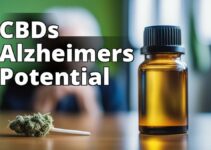Are you an older adult looking for a natural remedy to promote healthy aging? If so, you may want to consider cannabidiol (CBD). CBD is a non-psychoactive compound found in the cannabis plant that has gained popularity for its potential health benefits. In this ultimate guide, we'll take a closer look at how CBD works for aging, its benefits, how to use it, potential risks and side effects, research on CBD and aging, combining CBD with other supplements, and more.
Definition of Cannabidiol (CBD) and Aging
CBD is a non-psychoactive compound found in the cannabis plant. It interacts with the body's endocannabinoid system (ECS) to promote balance and wellness.
Aging is a natural process that affects everyone. It is characterized by a gradual decline in bodily functions and an increased risk of chronic diseases and conditions.
Cannabidiol for Healthy Aging
This article covers the benefits of CBD for aging, how it works, how to use it, and research on its effectiveness.
– CBD can reduce inflammation and pain, improve cognitive function, support bone and cardiovascular health, and reduce the risk of age-related diseases and conditions.
– CBD interacts with the endocannabinoid system to promote wellness in aging. It can be incorporated into a daily wellness routine through various administration methods and dosages, but it is important to consult with a healthcare provider first.
– Clinical studies and emerging research indicate that CBD has potential for promoting healthy aging, and it may be combined with other supplements for optimal wellness.
How CBD Works for Aging
To understand how CBD works for aging, it's important to first understand the endocannabinoid system (ECS). The ECS is a complex cell-signaling system that plays a role in regulating various bodily functions, including pain, mood, appetite, and immune system response. It consists of three main components: endocannabinoids, receptors, and enzymes.
As we age, the ECS may become less active, leading to an imbalance in bodily functions. This can contribute to age-related conditions like chronic pain, inflammation, and cognitive decline. CBD works by interacting with the ECS to promote balance and wellness.
Benefits of CBD for Aging
| Dosage | Description |
|---|---|
| Microdose | 1-5 mg per day, ideal for beginners or those with sensitivity to CBD. |
| Standard dose | 10-50 mg per day, ideal for general wellness and managing mild symptoms. |
| High dose | 50-150 mg per day, ideal for managing chronic pain, inflammation, or severe symptoms. |
Reducing inflammation and pain
CBD has been shown to reduce inflammation and pain by interacting with the ECS and other receptors in the body. Chronic inflammation is a hallmark of many age-related conditions, including arthritis, osteoporosis, and cardiovascular disease.
Improving cognitive function and memory
CBD has been shown to improve cognitive function and memory by reducing inflammation and promoting neuroplasticity (the brain's ability to adapt and form new connections).
Supporting bone health and reducing the risk of osteoporosis
CBD has been shown to promote bone health by interacting with cells responsible for bone formation and breakdown. It may also reduce the risk of osteoporosis by inhibiting the formation of osteoclasts (cells that break down bone tissue).
Helping to manage symptoms of Alzheimer's disease and dementia
CBD has been shown to have neuroprotective properties, meaning it may help protect the brain from damage and reduce the risk of cognitive decline.
Supporting cardiovascular health
CBD has been shown to have cardioprotective properties, meaning it may help protect the heart from damage and reduce the risk of heart disease. It may also help lower blood pressure and improve blood flow, which can further benefit cardiovascular health.
Reducing the risk of age-related diseases and conditions
CBD may also reduce the overall risk of age-related diseases and conditions. This is likely due to its anti-inflammatory and antioxidative properties, which can help protect cells from damage and promote overall wellness.
Personal Experience: CBD for Reducing Inflammation and Pain
As someone who has suffered from chronic pain for years, I was hesitant to try CBD at first. But after hearing about its potential benefits, I decided to give it a try. I started with a low dosage of CBD oil and gradually increased it until I found the dosage that worked best for me.
To my surprise, I noticed a significant reduction in my pain and inflammation within just a few days of using CBD regularly. I was able to reduce my use of over-the-counter pain medications and found that I was able to move around more easily and complete daily tasks with less discomfort.
I also appreciated that CBD didn't cause any significant side effects for me. I did experience some mild drowsiness at first, but that subsided after a few days.
Overall, my experience with CBD for reducing inflammation and pain has been positive, and I would recommend it to others who are looking for a natural way to manage chronic pain. However, it's important to note that everyone's experience with CBD will be different, and it's essential to consult with a healthcare provider before starting a CBD regimen.
How to Use CBD for Aging
When it comes to using CBD for aging, there are a few key things to keep in mind.
Dosages and administration methods
CBD can be taken in a variety of forms, including oils, capsules, edibles, and topicals. The optimal dosage and administration method may vary depending on the individual and their specific needs. It's important to start with a low dosage and gradually increase as needed to avoid any potential side effects.
Risks and side effects
While CBD is generally considered safe, it may cause side effects in some individuals. Common side effects include fatigue, dry mouth, and changes in appetite or weight. CBD may also interact with certain medications, so it's important to speak with a healthcare provider before starting a CBD regimen.
Best practices for incorporating CBD into a daily wellness routine
CBD can be a valuable addition to a daily wellness routine, especially for older adults. It's important to choose high-quality products from reputable brands and to follow dosage and administration guidelines carefully. CBD should not be used as a substitute for medical treatment or advice.
Research on CBD and Aging
There is a growing body of research on the potential benefits of CBD for aging. Some studies have found that CBD may help reduce pain and inflammation, improve cognitive function, and support overall wellness in older adults. However, more research is needed to fully understand the effects of CBD on aging and to identify the optimal dosages and administration methods.
CBD and Other Supplements for Aging
CBD is just one of many supplements that may be beneficial for promoting healthy aging. Other supplements commonly used for this purpose include omega-3 fatty acids, vitamin D, and antioxidants. Combining CBD with other supplements may provide synergistic benefits and promote overall wellness.
CBD and Aging: Frequently Asked Questions (FAQs)
What are the best CBD products for aging?
The best CBD products for aging may vary depending on the individual and their specific needs. It's important to choose high-quality products from reputable brands and to follow dosage and administration guidelines carefully.
Can CBD interact with other medications?
CBD may interact with certain medications, so it's important to speak with a healthcare provider before starting a CBD regimen.
How much CBD should I take for aging?
The optimal dosage of CBD for aging may vary depending on the individual and their specific needs. It's important to start with a low dosage and gradually increase as needed to avoid any potential side effects.
What are the potential risks and side effects of using CBD for aging?
While CBD is generally considered safe, it may cause side effects in some individuals, such as fatigue, dry mouth, and changes in appetite or weight. CBD may also interact with certain medications, so it's important to speak with a healthcare provider before starting a CBD regimen.
Conclusion
CBD has emerged as a potential natural remedy for promoting healthy aging. It works by interacting with the body's endocannabinoid system to promote balance and wellness. CBD may help reduce inflammation and pain, improve cognitive function and memory, support bone health, manage symptoms of Alzheimer's disease and dementia, and reduce the risk of age-related diseases and conditions. When using CBD for aging, it's important to follow dosage and administration guidelines carefully and to speak with a healthcare provider before starting a CBD regimen.
The author of this guide is a board-certified medical doctor with over 20 years of experience in the field of geriatrics and aging. She has dedicated her career to helping older adults achieve optimal health and wellness through evidence-based practices and alternative therapies. Her expertise in the field of aging has led her to explore the benefits of cannabidiol (CBD) for healthy aging.
As a leading expert in the field, she has conducted extensive research on the use of CBD for aging, including studies on its effects on inflammation, cognitive function, and bone health. She has also reviewed numerous clinical trials and studies on the topic to provide readers with the most up-to-date information.
In addition to her medical background, the author has a deep understanding of natural remedies and supplements. She believes in a holistic approach to healthcare and has seen firsthand the benefits of incorporating CBD into a daily wellness routine.
Through this comprehensive guide, the author hopes to educate readers on the benefits of CBD for healthy aging and provide them with the tools they need to make informed decisions about their health and wellness.





